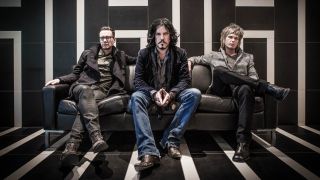Beirut may be more used to the thunder of guns than to the thunder of drums, but it was during a visit to the Lebanese capital in 2010 that The Tea Party’s guitarist/vocalist Jeff Martin was reminded of just how far his band’s music had spread. In the early 90s the trio he had founded in Toronto had been touted as Rock’s Next Big Thing, thanks to their welding together of Doors-esque atmospherics and Zeppelin-scale ambition.
But things hadn’t panned out as they’d hoped, and when Martin travelled to Beirut The Tea Party had acrimoniously split up five years earlier. Still, he’d heard that they had a big following there – perhaps not surprisingly, given how heavily they incorporated Middle Eastern motifs into their music – although, as he points out now, that could have meant 20 people.
“I played this beautiful catacomb club with chandeliers and candles everywhere, like something out of a movie set,” he recalls today. “I got ushered in through the back and walked on stage not knowing what to expect, and there’s five hundred people in front of me crying. It was incredible. If The Tea Party went there now there’d be a riot.”
The band never provoked that kind of reaction in their heyday, even among the small but devoted following that helped turn them into the cult-est of cult 90s rock bands. In an era where grunge had declared war on overblown musical endeavours, The Tea Party’s first two major-label albums – 1993’s Splendor Solis and 1995’s The Edges Of Twilight – recalled the mystical grandeur of the big beasts of the 70s, with the band switching from bombastic power trio one minute to acoustic troupe plucked from a North African bazaar the next (an attribute that landed them the mildly embarrassing tag ‘Moroccan roll’).
Other bands may have looked on enviously at the column inches they generated, but the press coverage never translated into tangible success outside of their home country (and, oddly, Australia). The introduction of subtle electronic influences on subsequent albums may have dragged them into the present, but it did little to elevate their profile. Worse, Martin’s fondness for extra-curricular excess was gradually alienating his bandmates: bassist Stuart Chatwood and drummer Jeff Burrows.
“My judgment was quite clouded by my appetites for the finer things in life,” offers the 44-year-old, sipping on a non-alcoholic cocktail of soda water and lemon squash in a quiet pub in the Sydney suburb of Erskineville, a beanie concealing his trademark flowing black locks. “The reason I was using them to such damaging excess was because I was unhappy with the way things were going with the band artistically and creatively.”
Though stopping short of detailing what exactly those excesses were, he will admit that the sessions for the band’s final album prior to splitting, 2004’s Seven Circles, their seventh, were like a “rock’n’roll circus. Too many hangers on, and nothing was getting done”. He had, he says, betrayed his bandmates’ trust by relinquishing his position as “captain of the ship” in favour of a lifestyle defined more by “Dorian Gray decadence” than by art. The music, and the band’s career, suffered accordingly.
While Chatwood moved into soundtrack work, composing the music for the Prince Of Persia videogames, and Burrows went on to form alt.rockers Crash Karma, Martin reacted to the band’s split by moving his young family to “the most rural part of Ireland” to heal himself and rediscover his passion for music by “playing in little pubs in front of ten people that didn’t know who the hell I was”. Three-and-a-half years later he moved to Australia to pursue a solo career, and released several live albums and a studio LP under his own name, as well as one record apiece with The Armada and Jeff Martin 777. He was, he admits, trying desperately to fill a Tea Party-shaped hole in his life.
“As much as I said in the press that I don’t need them, the truth be told that, of course, all of us missed it. I missed my friends. I’ve known Burrows since I was six years old.
I missed that special intuition, especially between Burrows and I, as a guitarist and drummer; it’s that Page-Bonham thing. And Stuart is the glue between us all.”
So why didn’t he just pick up the phone? “Because,” he shrugs, “I’m too proud.”
Promoters would routinely contact the band’s management with big-money deals for The Tea Party to reunite. But they were never ones to let a good payday get in the way of pride. After several knock-backs, Martin had a change of heart in 2010, telling his representatives that if the other two were up for it, he was as well. Meetings were scheduled, and Martin flew to Canada to meet with Chatwood and Burrows. “It was the first time we’d talked in years and it was so awkward,” he says. “I think Jeff was shaking, and I was like, ‘Another drink, please!’”
Though the trio marked their return to the stage with a series of Canadian shows in 2011, the idea of a new album wasn’t broached until, Martin says, he’d “proven to my two best friends once again that I could be the captain of the ship”. Even so, of the four sessions it took to record their new LP, The Ocean At The End, it was only during the second that Martin finally realised the ice between the three had thawed. And though the world is a very different place to how it was in 2004 – not least because the band’s name has been co-opted by a reprehensible political group in the US – Martin has no doubts that The Tea Party are still at the peak of their powers.
“The three of us knew that with the big statements we’ve made musically, this record had to at least stand side by side with the best of what we’ve done,” he says. “We don’t have to put this album out, we’re all wealthy men. We don’t need to do this for the money. We’re doing this for the art. And if it didn’t stand side by side with the best things we’ve done in our career, then we wouldn’t be talking right now.”
The Ocean At The End is out now on InsideOut


